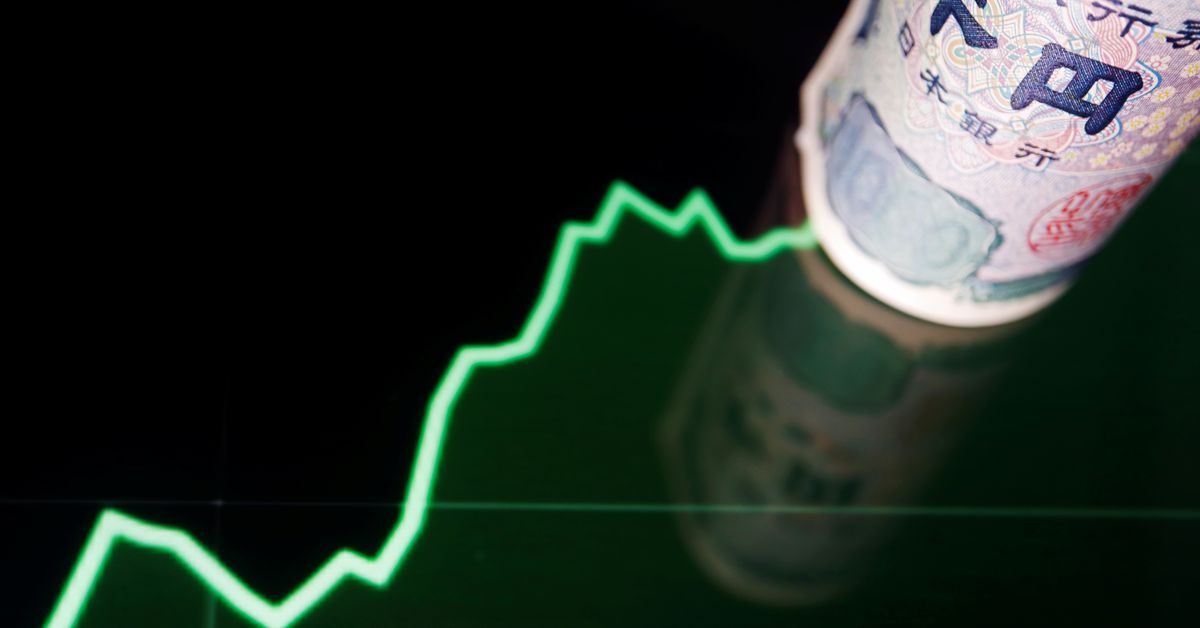A banknote of Japanese yen is seen with a currency exchange rate graph in this illustration picture taken June 16, 2022. REUTERS/Florence Lo/Illustrat
A banknote of Japanese yen is seen with a currency exchange rate graph in this illustration picture taken June 16, 2022. REUTERS/Florence Lo/Illustration
Register now for FREE unlimited access to Reuters.com
TOKYO, Sept 14 (Reuters) – The Bank of Japan has conducted a rate check in apparent preparation for currency intervention, the Nikkei newspaper reported on Wednesday, as policymakers stepped up warnings about sharp falls in the yen.
The yen rose slightly from a near 24-year low against the dollar after the report, which cited unidentified sources, and was trading around 143.89 at 0520 GMT.
The currency has depreciated around 20% so far this year, as the Bank of Japan (BOJ) has kept policy super-loose while many of its global peers, such as the U.S. Federal Reserve, have aggressively raised interest rates to combat surging inflation, making Japanese assets less attractive to investors.
Register now for FREE unlimited access to Reuters.com
Aside from verbal warnings, Japanese policymakers have several options to stem excessive yen falls. Among them is a rare direct intervention in the currency market, selling dollars and buying up large amounts of yen.
A rate check by the BOJ, a practice in which central bank officials call up dealers and ask for the price of buying or selling yen, is seen in currency markets as a possible precursor to action. read more
When the BOJ made its check, the rate was around 144.9 to the dollar, Jiji news agency said, citing a market source. The 145 mark is seen as a key level for market watchers.
Many traders remained doubtful that intervention was imminent, but the jump in the yen pointed to rising nerves. The timing of the BOJ’s move also suggests that 145 per dollar will be an important level for markets and the authorities.
“My feeling is that the Ministry of Finance won’t intervene at this stage and will leave it at verbal warnings,” said Takeshi Minami, chief economist at Norinchukin Research Institute in Tokyo.
“There’s still a week before the Fed’s rate-setting meeting. I don’t think markets believe the ministry will intervene at current dollar/yen levels.”
Japanese Finance Minister Shunichi Suzuki said earlier on Wednesday that currency intervention was among options the government would consider.
Data issued on Tuesday showing unexpectedly strong U.S. inflation for August prompted bets on the U.S. Federal Reserve raising interest rates higher and for longer, increasing downward pressure on the yen.
“Recent moves are rapid and one-sided, and we’re very concerned. If such moves continue, we must respond without ruling out any options,” Suzuki told reporters on Wednesday.
“We’re talking about taking all available options, so it’s correct to think so,” Suzuki said when asked whether yen-buying currency intervention was among the government’s options.
The remark was the strongest to date by government officials in signalling the possibility of currency intervention, which markets have nonetheless considered highly unlikely due to the difficulty Tokyo would face in getting agreement from its G7 partners.
Chief Cabinet Secretary Hirokazu Matsuno also told a briefing earlier on Wednesday the government would take necessary action should excessive yen moves continue.
“We’re extremely concerned over excessive volatility,” Matsuno said.
Rob Carnell, head of research, Asia-Pacific, at ING in Singapore, noted obstacles to Japan intervening in the market.
“Never say never. They have been stepping up the rhetoric lately,” he said. “But I would be cautious about the inevitability of their intervening. Japan is a signatory to the G20 and they have got policies about not intervening.”
The BOJ has no intention of raising interest rates or tweaking its dovish policy guidance to prop up the yen, three sources familiar with its thinking told Reuters earlier. read more
Once welcomed for giving exports a boost, the yen’s weakness is becoming a cause for headaches for Japanese policymakers, because it hurts households and retailers by inflating the already rising prices of imported fuel and food.
Yen-buying intervention has been very rare. The last time Japan intervened to support its currency was in 1998, when the Asian financial crisis triggered a yen sell-off and a rapid capital outflow from the region. Before that, Tokyo intervened to counter yen falls in 1991-1992.[nL4N30C0G5]
Register now for FREE unlimited access to Reuters.com
Reporting by Tetsushi Kajimoto and Leika Kihara; Additional reporting by Kantaro Komiya Daniel Leussink and Tom Westbrook; Writing by Kim Coghill; Editing by Neil Fullick and Bradley Perrett
Our Standards: The Thomson Reuters Trust Principles.
www.reuters.com
